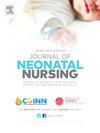The influence of facilitated tucking on behavioral and physiological outcomes in premature neonates undergoing endotracheal suctioning: A randomized control trial
Q2 Nursing
引用次数: 0
Abstract
Background
Premature neonates in hospitals often endure significant discomfort and stress due to illnesses and invasive procedures. Facilitated tucking helps ease this distress, aiding in developing self-regulation skills for managing pain and stress. This study aimed to determine the influence of facilitated tucking on behavioral and physiological outcomes in premature neonates undergoing endotracheal suctioning. Design: A randomized control trial with two parallel groups. Method: Forty premature neonates receiving endotracheal suctioning were randomly allocated to two groups. The study group was positioned in facilitated tucking, while the control group received traditional care during suctioning, with 20 neonates in each group. Setting: Neonatal Intensive Care Unit of Kafrelsheikh University Hospital, Egypt, from December 2022 to May 2023. Three tools were used: Characteristics of Premature Neonates Assessment, Premature Neonates' Physiological Assessment, and Anderson Behavioral State Scale.
Results
Premature neonates in the study group exhibited greater physiological stability than the control group, with SpO2 (94.50 ± 1.19 vs. 94.15 ± 1.31), heart rate (151.00 ± 5.39 vs. 156.40 ± 1.54), and respiratory rate (49.60 ± 2.09 vs. 52.60 ± 2.96) at 2 min post-suction, all showing P < 0.001. No neonates in the study group showed restless activity or fussiness after suction, with significant differences in behavioral response between groups at 2 and 4 min post-suction across all three days (p < 0.001).
Conclusion
Facilitated tucking positively affects physiological and behavioral stability in premature neonates. Practice implications: the current research directs NICU nurses to include facilitated tucking in standard daily care during painful procedures for premature infants. As it assists premature neonates in developing self-regulation skills in managing pain and stress.
便利收纳对气管内吸引早产儿行为和生理结局的影响:一项随机对照试验
背景:由于疾病和侵入性手术,医院里的早产儿经常承受巨大的不适和压力。方便的收纳有助于缓解这种痛苦,帮助发展自我调节技能来管理疼痛和压力。本研究旨在确定便利收纳对接受气管内吸引的早产儿行为和生理结果的影响。设计:随机对照试验,两组平行。方法:将40例接受气管内吸痰的早产儿随机分为两组。研究组采用便利收纳位,对照组采用传统吸痰护理,每组20例。地点:埃及Kafrelsheikh大学医院新生儿重症监护室,从2022年12月至2023年5月。使用三种工具:早产儿特征评估、早产儿生理评估和安德森行为状态量表。结果研究组早产儿生理稳定性优于对照组,吸痰后2min SpO2(94.50±1.19比94.15±1.31)、心率(151.00±5.39比156.40±1.54)、呼吸频率(49.60±2.09比52.60±2.96)均显示P <;0.001. 实验组中没有新生儿在吸痰后出现躁动或躁动,在吸痰后3天内,两组在吸痰后2分钟和4分钟的行为反应有显著差异(p <;0.001)。结论便利收纳对早产儿生理和行为稳定性有积极影响。实践启示:目前的研究指导新生儿重症监护室护士在早产儿痛苦的过程中纳入标准的日常护理。因为它帮助早产儿发展自我调节技能,管理疼痛和压力。
本文章由计算机程序翻译,如有差异,请以英文原文为准。
求助全文
约1分钟内获得全文
求助全文
来源期刊

Journal of Neonatal Nursing
Nursing-Pediatrics
CiteScore
2.00
自引率
0.00%
发文量
143
期刊介绍:
Aims & Scope: This is the practical, bimonthly, research-based journal for all professionals concerned with the care of neonates and their families, both in hospital and the community. It aims to support the development of the essential practice, management, education and health promotion skills required by these professionals. The JNN will provide a forum for the exchange of ideas and information between the range of professionals working in this field; promote cooperation between these professionals; facilitate partnership care with families; provide information and informed opinion; promote innovation and change in the care of neonates and their families; and provide an education resource for this important rapidly developing field.
 求助内容:
求助内容: 应助结果提醒方式:
应助结果提醒方式:


